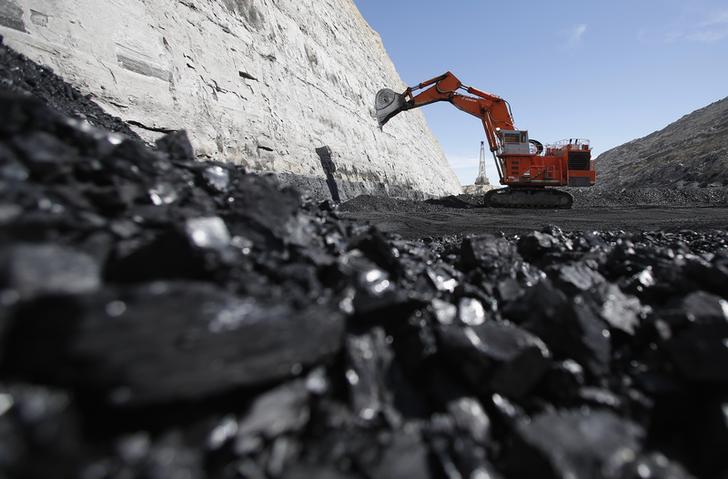UPDATE l Egypt's cabinet approves use of coal for power generation

By Maggie Fick
CAIRO, April 2 (Reuters) - Egypt's cabinet on Wednesday approved the use of coal for power generation, a move likely to bring relief to the energy-hungry cement industry but anger those who see the pollutant fuel as a potential public health hazard.
The cabinet decision followed a fierce debate within the government over whether the fuel should be permitted for use by cement companies.
Struggling to avoid public unrest over blackouts, the government has cut natural gas supplies to factories, prompting cement companies to renew their demand to use coal.
They argue cement is vital for construction projects to provide jobs and trigger growth for an economy hit hard by turmoil since an uprising toppled Hosni Mubarak in 2011.
Companies including Lafarge and Suez Cement , which lists Italecementi as its main shareholder, were rattled by the gas supply cut.
They have said the industry has been operating at half capacity since the gas reductions began in January.
"We are very happy (about) the decision," Suez Cement CEO Bruno Carre told Reuters. "We will do our best to implement it as soon as possible to alleviate the pressure and contribute to a milder energy crisis."
Environmentalists have said the use of coal as energy would be catastrophic for Egypt, which already has one of the worst pollution levels in the world.
"The government is claiming to solve an issue with coal, but they are adding dozens of other problems that the country cannot afford to address," said Hoda Baraka, a Cairo-based advocate with global climate campaign 350.org.
Despite government efforts to conserve gas, blackouts have darkened homes this winter, months ahead of peak electricity use in the summer, when many crank up their air-conditioning units - a sign of the most severe energy crunch in years.
The government announced the decision a day after an emergency meeting convened by the prime minister to address a wave of rare power cuts around the country this week.
Disarray in the energy sector will pose a major challenge to whoever wins next month's presidential election.
The government acknowledges the unsustainable nature of Egypt's energy mix - 91 percent of power generation comes from oil and gas. Prior to the coal decision, there had been no consensus on how to diversify it.
The cement industry had said there was no alternative to coal, dismissing hopes of serious investment in renewable energy as unlikely until costly fuel subsidies are tackled.
The cabinet said it would expand the proportions of refuse-derived fuel and renewable energy in the mix to "reduce harmful emissions, especially in touristic and densely-populated areas."
Asked when companies would be able to use coal, government spokesman Hani Salah said "most environmental studies" had been conducted and predicted it would "not be very long".
The cabinet said in a statement that the government was committed to applying "controls and environmental standards" in all phases of the import, storage, and use of coal.
Environment Minister Laila Iskander has said Egypt's worsening energy problems and the demands of heavy industry were no reason to embrace coal, citing a lax regulatory climate as a block to adequate oversight of coal use. She was not immediately available for comment on the decision.
LONG-TERM POLICY
Activists say even the chaos in Egypt's energy sector can never justify the use of coal.
"Companies are abusing a short term crisis to dictate long-term energy policy," said Ahmed Al-Droubi, a coordinator of the Egyptians Against Coal movement.
"The government is claiming to solve an issue with coal, but they are adding dozens of other problems that the country cannot afford to address," said Hoda Baraka, a Cairo-based advocate with global climate campaign 350.org.
Government spokesman Salah said he could not comment on the details of financing the import of coal. But Carre said companies were prepared to pay the full cost for the switch.
"We are going to organise the investment and the logistics to buy the coal directly from the international market," he said. "This won't cost the government anything."
He said to convert Suez Cement plants to coal would cost around 200 million Egyptian pounds ($28.68 million) each.
Depending on the regulations set by the government, Carre anticipates that one of the company's four plants could be ready to run on coal by September.
Coal, which many countries are working to phase out, has never been used by the cement industry in Egypt, largely because the government has supplied the 21 cement companies with heavily subsidised gas feedstock and diesel. Experts say the industry accounts for 10 percent of Egypt's overall energy consumption.
($1 = 6.9724 Egyptian Pounds) (editing by David Evans)









facebook comments